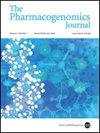Genetic association analysis and frequency of NUDT15*3 with thiopurine-induced myelosuppression in patients with inflammatory bowel disease in a large Dutch cohort
IF 2.9
3区 医学
Q2 GENETICS & HEREDITY
引用次数: 0
Abstract
Thiopurine drugs are cornerstone treatment for patients with inflammatory bowel disease (IBD). The most common adverse drug reaction is thiopurine-induced myelosuppression (TIM), that may partly be explained by the genetic polymorphism NUDT15*3. The aim of this retrospective study was to determine the NUDT15*3 polymorphism frequency and its association with TIM in an IBD patient population in the Netherlands. DNA from patients previously genotyped for TPMT was genotyped for NUDT15*3. In IBD patients treated with thiopurines association tests with TIM were conducted. Out of 988 included patients, 13 (1.3%) were heterozygous for NUDT15*3. Of all patients, 606 had IBD and received thiopurine treatment. In these patients, 8/606 (1.3%) were heterozygous polymorphic for NUDT15*3 of which 50.0% developed TIM compared to 2.3% in the wild type patients (p < 0.001). The study results show a clinically relevant prevalence of NUDT15*3 in the Dutch patient population. Its strong association with TIM suggests pre-therapeutic genotyping potentially clinically utile.

荷兰大型队列中炎症性肠病患者 NUDT15*3 与硫嘌呤诱导的骨髓抑制的遗传关联分析和频率。
硫嘌呤类药物是治疗炎症性肠病(IBD)患者的基础药物。最常见的药物不良反应是硫嘌呤诱导的骨髓抑制(TIM),其部分原因可能与 NUDT15*3 基因多态性有关。这项回顾性研究旨在确定荷兰 IBD 患者中 NUDT15*3 多态性的频率及其与 TIM 的关系。对之前进行过 TPMT 基因分型的患者的 DNA 进行了 NUDT15*3 基因分型。对接受硫嘌呤治疗的 IBD 患者进行了与 TIM 的关联测试。在纳入的 988 名患者中,有 13 人(1.3%)是 NUDT15*3 的杂合子。在所有患者中,606 人患有 IBD 并接受了硫嘌呤治疗。在这些患者中,8/606(1.3%)人是 NUDT15*3 的多态杂合子,其中 50.0% 的患者出现了 TIM,而野生型患者中只有 2.3% 出现了 TIM(P<0.05)。
本文章由计算机程序翻译,如有差异,请以英文原文为准。
求助全文
约1分钟内获得全文
求助全文
来源期刊

Pharmacogenomics Journal
医学-药学
CiteScore
7.20
自引率
0.00%
发文量
35
审稿时长
6-12 weeks
期刊介绍:
The Pharmacogenomics Journal is a print and electronic journal, which is dedicated to the rapid publication of original research on pharmacogenomics and its clinical applications.
Key areas of coverage include:
Personalized medicine
Effects of genetic variability on drug toxicity and efficacy
Identification and functional characterization of polymorphisms relevant to drug action
Pharmacodynamic and pharmacokinetic variations and drug efficacy
Integration of new developments in the genome project and proteomics into clinical medicine, pharmacology, and therapeutics
Clinical applications of genomic science
Identification of novel genomic targets for drug development
Potential benefits of pharmacogenomics.
 求助内容:
求助内容: 应助结果提醒方式:
应助结果提醒方式:


